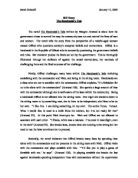- Jonathan Swift, "A Modest Proposal"
- Satiric essay produced in 1729, Swift’s satire of how to solve hunger problems in Ireland
- Proposes that the raising of children for sale as a food and commodity item = alleviate povery of family
- Controlled, sincere tone of unnamed proposer of this scheme parallels earnest fanaticism of Gilead
-
Biblical event forms justification for 20th century Gilead’s Handmaid system → women who fail to conceive are devalued
-
Highlights hard-heartedness of the English → allowed Irish masses to starve by proposing them to eat children
In the desert there is no sign that says, Thou shalt not eat stones.
- Sufi proverb
- Islamic proverb; no laws against the obvious
- People were not meant to eat stones; traveller in desert would not expect to see a prohibition against such meal
-
Suggests that power can be secured by controlling access to scarce resources → in desert, stones are not a resource but food and water are
- No law, moral or social will forbid anyone to eat stones
- Nature is not at fault, rules may be termed for common good but may be against nature
Three epigraphs are conjoined by 3 images: Produce, Food, Eating which connect with The Handmaid’s Tale by Maragret Atwood
Produce
-
Genesis 30 : Jacob asks Rachel if he is accused of denying her “the fruit of the womb”
- Rachel is infertile, asks husband to consider her handmaid Bilhah
- Custom of which wife embraces handmaid to symbolize the baby produced is legally the wife’s property
- “The Handmaid’s Tale” extrapolates from this point, unlikely that puritanical religious rights would adopt this type of sexual practice
- Atwood depicts that patriarchal traditions which depict women as means of soley reproduction is no different than modern customs of labelling women as sex objects
-
Selective use of quote from Old Testament illustrates how dangerous it is to take single quotes from the Bible without putting them in proper context → misused for purpose of pushing particulate agenda
- Handmaids were suppressed of civil rights and Bible is referred to in novel without proper citation
Food/Eating
-
Jonathan Swift : Children are proposed as means of consumption to elimiate poverty
- “Unbabies” sent to colonies due to undesired traits, elimiates mutation in society
- Cannabalistic economy – provides vain, idle, visionary thoughts like life as a handmaid
- Eating babies is exactly opposite of beliefs in Gilead; where surrogate mothers are machines of state apparatus
- Humans need food to survive; Offred buys nourishing goods to live off fat of the land for healthy reproduction
- Proper nourishment for mothers = controlled diet; no cigarettes or alcohol
- Offred gets fed milk, meat, grain, chicken, strawberries and radish to improve health
- Unlike morals from “A Modest Proposal”, there are too many offspring whereas in Gilead there is a deficient number
In The Handmaid’s Tale, infertile women are to look for handmaids if they desire an offspring. This is where the handmaid would be “owned” by a couple, and sexual practices without romance would take place between the handmaid and the husband (Commander). The ceremony follows after reading the bible, which is evident in Genesis 30:1-3, where Rachel suggests to Jacob that he has sex with her handmaid for children. She is jealous of her elder sister Leah, who is fertile and bears two children. Jacob makes it clear that Rachel is “withheld from fruit of the womb”, where he degrades Rachel. This signifies the act of sending an “unwoman” to the Colonies, where she is forced to be dispatched to toxic clean-up crews if she does not produce in a given time.
Eating children to reduce poverty occurs when there is an overpopulation of offspring, or that a family is in poverty. This practice
is suggested by Jonathan Swift, where he supports cannibalism. This belief is the exact opposite of the rules in the Republic of Gilead, where babies were not common and infertile women had to turn to handmaids for reproduction. To have a baby meant a way out of oppression from other people and it meant to never be labelled an “unwoman”, therefore not being sent to the Colonies.
As seen by all the commanders and hierarchies in The Handmaid’s Tale, the handmaids are controlled and kept from many things other than shopping for produce. They were not allowed to read or make eye contact with other males. The fact that the quote suggests that power can be secured by controlling access to scarce resources, by taking away privileges and things handmaids can connect to; they have absolute power.







